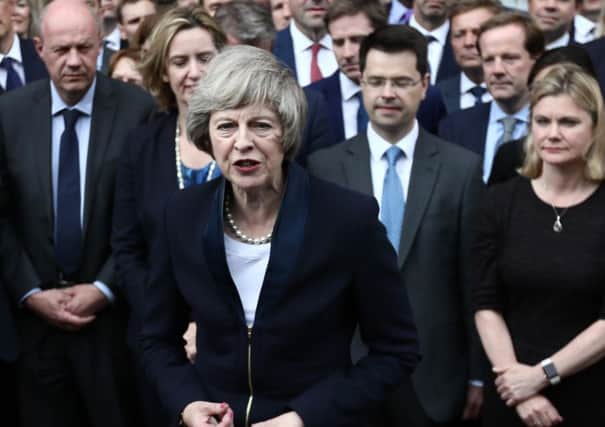Leaders: May must lead, unify and leave the ballot box alone


Theresa May will have many items on her to-do list as she takes over the top job. But one of them should not be calling a general election.
Andrea Leadsom was absolutely right when she said that now was not the time for a long, drawn-out leadership battle in the Conservative party and Britain needed to get on with its political business. There may be suspicions that Mrs Leadsom was motivated by the numbers of MPs she had backing her and saw that support was unconvincing, it may be in knocking out Michael Gove she had completed her main task anyway. Almost certainly the criticism she stepped into with her remarks on motherhood gave her a taste of the territory she was seeking, and perhaps that helped her to realise that she does not have the experience to take over as prime minister.
Advertisement
Hide AdAdvertisement
Hide AdMs May has made it clear she believes that the country needs strong leadership and she can provide it. So far she has shown that by making it perfectly clear that her belief is that the referendum result must be recognised and adhered to, and she is right to do that. There will be plenty of people who voted to leave the EU who are stunned that none of the political leaders they listened to have emerged in any position of power and that the negotiations for exit will now be overseen by someone who advocated staying in. Those voters need to be convinced that the spirit of the vote is carried through to the negotiations.
But Ms May must show strong leadership when it comes to getting on with bringing the country back together and dealing with the economic and political fallout from the referendum. The fact is that under our system parties pick their leaders and therefore the winning party picks the prime minister. There is no need for her to go to the country to seek her own mandate. The last thing Britain needs at this point is to be immersed in the uncertainty of a general election.
There are some within the party reported to be agitating for an election to take advantage of Labour’s disarray because they think that they might improve their majority in the house. That would be political opportunism at its worst and Ms May has to realise the disaster even the perception of such action would bring.
If there are doubts about Ms May they have to be over her decision to take a back seat on the EU referendum, giving only nominal support, because that looks more like an ambitious politician than a strong leader.
And as for David Cameron, the earlier he leaves the stage the better, only once he is gone will the country begin to move on. His legacy will be one of the biggest avoidable errors perpetrated by any post-war prime minister. His belief that he could be the statesman that could end the rift in the Conservative party over Europe turned out to be shatteringly naive, and he has presided over one of the greatest political upheavals in modern Britain and it still has a long way to run. Andy Murray might say he doesn’t want to do the job given its complexities and responsibilities, but he would probably be better at it than Cameron turned out to be.
Nimrod debacle dogs Boeing deal
News that the UK government has signed a £3 billion deal with Boeing which will create jobs and investment at RAF Lossiemouth is to be welcomed.
But questions remain about the scrapping of the Nimrod fleet five years ago.
David Cameron announced yesterday that the American aircraft giant will build a new £100m facility at the Moray base, with the creation of around 100 jobs.
Advertisement
Hide AdAdvertisement
Hide AdThe agreement is part of a larger deal which will see the UK buy nine new marine patrol planes used to hunt submarines.
The P-8 Poseidon is a modified version of passenger aircraft that has been heavily adapted for military use.
Boeing will also deliver 50 Apache AH-64E attack helicopters to the Army and expects to create a total of 2,000 jobs in the coming years.
The decision to base the Poseidon at Lossiemouth will help fill the gap left following the decision to scrap a generation of Nimrod aircraft in the 2010 defence review.
That debacle has never been fully explained. Commissioned in 1993 and due to enter service in 2012, the government scrapped the £4bn fleet in 2011, saying the move would save £2bn over the next decade. That monumental decision – apparently done at the stroke of a pen – ended up costing the taxpayer £3.4bn, according to Public Account Committee, and left a “massive gap” in British security, according to ex-defence chiefs.
Yet still it has never been subject to proper scrutiny and now never will be. That is a depressing indictment of our political system.
That decisions of that magnitude can be taken without proper accountability is no doubt one of the reasons so many feel completely cut off from politics.